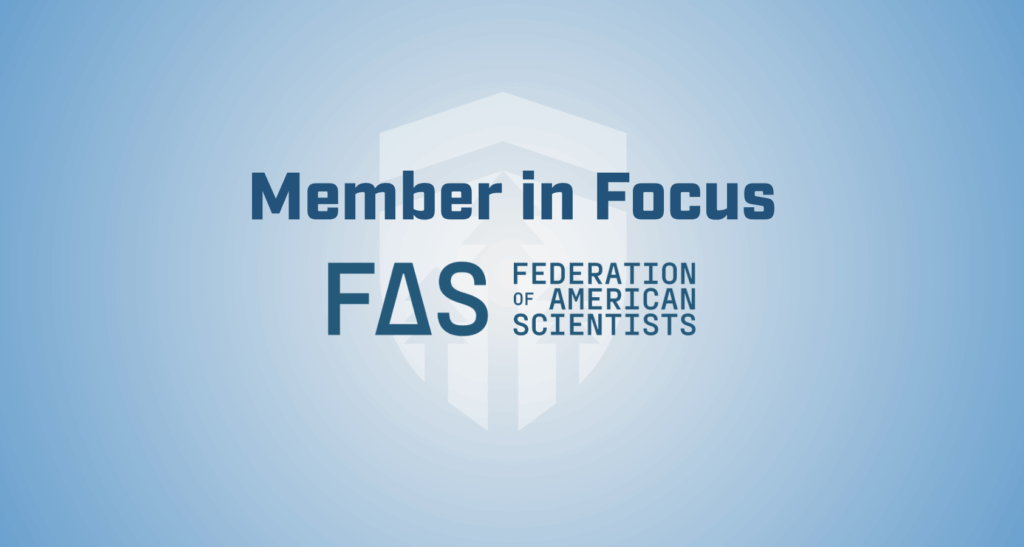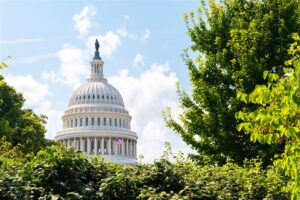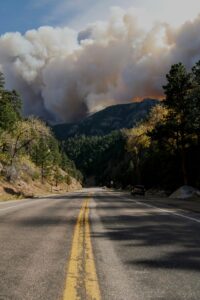Member in Focus: Federation of American Scientists
Partners in Wildfire Prevention is a coalition of organizations from various industries, regions, and sectors committed to raising awareness about the growing wildfire crisis and advocating for a coordinated, national response to wildfires. Our broad and diverse membership demonstrates how wildfires are truly a national issue and require a national solution.
To explore the wildfire crisis in-depth, James Campbell, wildfire policy specialist at the Federation of American Scientists (FAS), spoke with the coalition to discuss how FAS is helping to address wildfire-related issues. Highlighting the unique perspectives and backgrounds of our members is one way in which Partners in Wildfire Prevention is working to bring attention to solutions that can help shape our national response to wildfires.
About the Federation of American Scientists
Founded in 1945, FAS is a nonpartisan, nonprofit organization focused on advancing science in the public interest and solving present-day challenges by collaborating with decision-makers, technical experts, and other stakeholders. Originally founded to focus on nuclear nonproliferation, FAS’ scope has expanded over time to encompass a variety of issues, including climate and the environment, clean energy, emerging technologies, and wildfire policy.
Their Work on Wildfire Prevention
As part of their work on climate, energy, and environment issues, FAS actively engages in wildfire policy conversations, helping to ensure America is better prepared for wildfires by promoting evidence-based solutions and legislation. As a champion of science, FAS also plays an active role in educating stakeholders and policymakers on both sides of the aisle on the impacts of wildfires through policy briefs and media engagement.
“Our wildfire team is working to build a more fire-resilient nation through policy development and analysis, capacity-building, and issue education,” said Campbell. At FAS, Campbell plays a key role in the development of wildfire policy as a leader of FAS’ wildfire legislative strategy.
What They Support
FAS understands and emphasizes that wildfires can have devastating impacts when they threaten lives, property, and livelihoods. FAS is committed to a strong, coordinated national response to wildfires, especially when they begin to affect the wildland urban interface, an area of transition between wildland vegetation and structures, as well as other human development. Wildfires do not abide by jurisdictions, impacting geographical regions and states nationwide. For FAS, how we respond to wildfires is more than just prevention — it is about building more resilient communities and learning to live with fire.
“We know that fire is happening across the country [in] many different types of ecosystems, affecting many different types of communities. A coordinated national response is sorely needed to get a handle on this problem,” said Campbell.
To develop a comprehensive federal response, FAS advocates for policies to address key challenges in wildfire responsiveness. This includes prioritizing smart, targeted suppression efforts to protect communities and maintaining the appropriate staffing needed for a robust wildfire workforce. FAS also believes that the health of first responders and our communities should be a central focus, given the devastating impact wildfires have on respiratory and cardiovascular health.
Wildfires are not going away and are a natural part of the environment in which many Americans live. To effectively respond to wildfires, FAS advocates for prescribed fire which is an integral land management tool to prepare for and reduce the severity of wildfires when they do occur. FAS hopes to provide education around the important fact that not all fires are bad, and that there can be benefits to managed wildfires in the ecosystems in which they occur.
FAS recognized that we know wildfires will happen. We can’t and shouldn’t stop wildfires from happening, but we can minimize their negative impacts on people and property while maximizing their benefits for communities and ecosystems.
Why They Support the Fix Our Forests Act
Integral to FAS’ goal of wildfire policy reform is the bipartisan Fix Our Forests Act, a priority of the coalition, which would improve how the country approaches wildfire prevention and response strategies. As an early champion of the bill, FAS worked closely with House Committee on Natural Resources Chairman Rep. Bruce Westerman (R-AR) and Rep. Scott Peters (D-CA) on the bill’s initial introduction. Since then, the bill has gone through multiple iterations, and FAS is a supporter of the current bill version under consideration in the Senate.
If passed, FAS noted that the Fix Our Forests Act would be an important step in the right direction for how we approach wildfires. Especially key for FAS is Section 102 of the bill, which would establish the Wildfire Intelligence Center, a central hub to coordinate government efforts across federal agencies to prepare for and respond to wildfires and leverage real-time data to inform and enhance decision-making outcomes.
“FAS believes that this is truly crucial to transforming how we’re going to prepare for, prevent, respond to, and recover from wildfires across the United States,” said Campbell.
In addition to the Wildfire Intelligence Center, FAS is supportive of other policy provisions in the bill meant to provide potential solutions to the impact of wildfires on our communities. These include policy on utilizing livestock grazing to reduce wildfire risk, coordinating federal wildfire risk reduction efforts, investing in science and research, and leveraging public-private partnerships to deploy wildfire technology. For frontline workers who risk everything to keep our communities safe, the Fix Our Forests Act also includes an important provision on establishing a wildland fire management casualty assistance program.
Why FAS Joined Partners in Wildfire Prevention
As a member of Partners in Wildfire Prevention, FAS aims to demonstrate to policymakers that there is broad support for a national, coordinated response to help prevent catastrophic wildfires. Wildfires are a national issue, making it imperative to engage in broad collaboration to make meaningful progress. In addition to supporting the Fix Our Forests Act, FAS shares other important policy and management goals with the coalition.
“We know that we have to have a broad-based coalition to advance critical investments in prevention. Some of the investments that we see all of us being able to agree on [include] advanced modeling, increasing our data and technology capacity. FAS is incredibly excited to bring a science-based perspective and policy expertise to collaborating with all of our partners in this coalition,” said Campbell.



